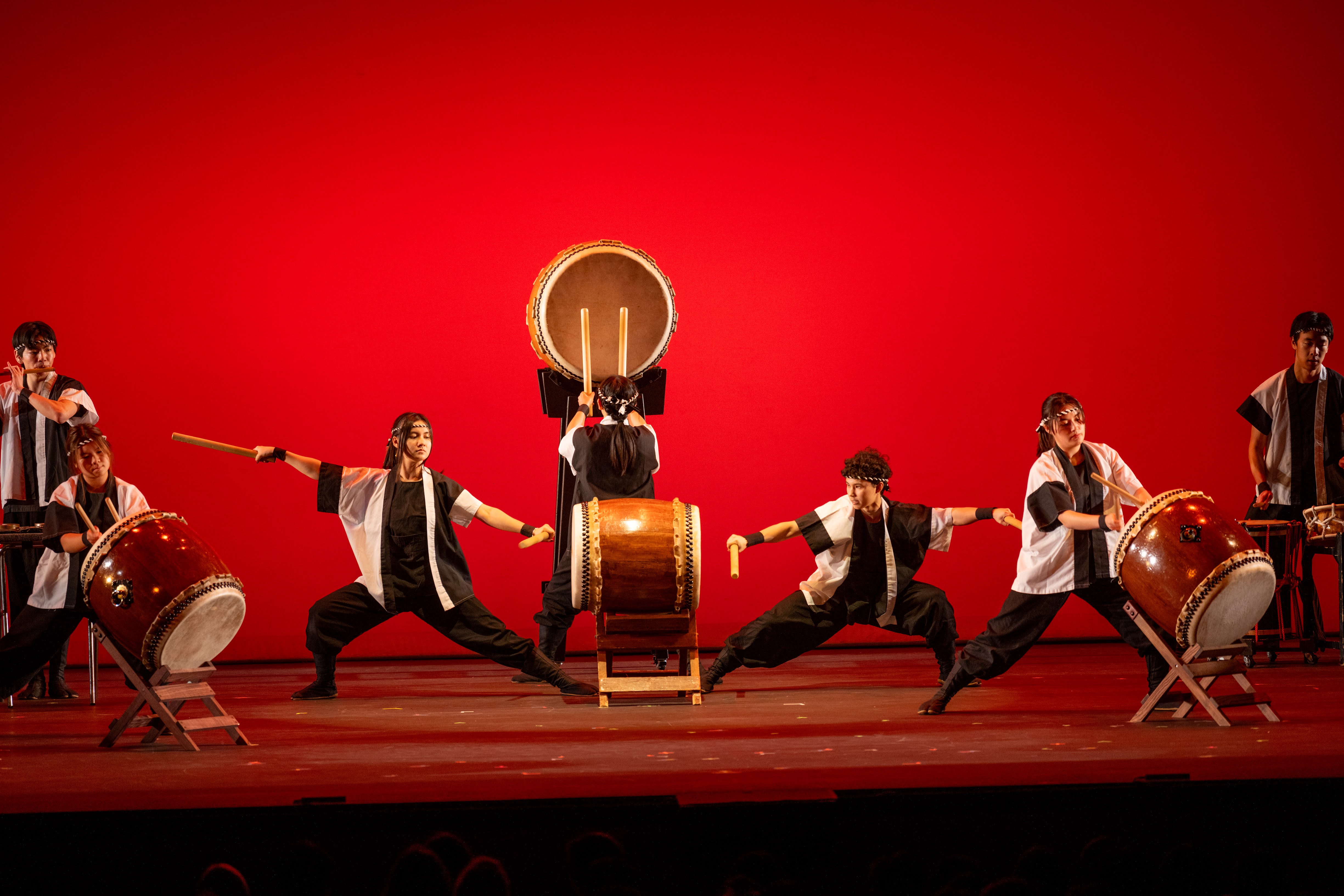Bombastic taiko drums. Energetic hip-hop choreography. Comedic, yet heartfelt plays. Royce Hall was buzzing with life and energy as UCLA’s Nikkei Student Union (NSU) took the stage to showcase their 38th annual Cultural Night performance on Sunday, February 24. This year’s performance was titled “Tayousei (多様性),” a Japanese term that translates to “diversity,” and this served as the thematic direction of the production.
Lauren Aoyama, a third-year chemical engineer and one of the Cultural Night producers, said that it was a joy “seeing all these different experiences that people bring” to the NSU community “even when everyone has a different connection to their Japanese heritage.”
The night opened up with a performance from NSU’s Kyodo Taiko, America’s first collegiate taiko drumming team. The term “Kyodo” translates to “family” and “loud children,” perfectly embodying the bombastic and joyous spirit of taiko drumming. The group performed pieces including “Delta,” “Jikan,” “Okami,” and “Encore Remix,” all of which were celebrations of community, culture, and cheerful times.
Following Kyodo Taiko were performances by UCLA’s NSU Modern, a nationally recognized hip-hop dance group that also performs various other dance styles. They have performed and won countless competitions within and beyond UCLA, but one of their crowning achievements has been their ability to provide opportunities for Bruins who share a deep passion for “dance, performance, and creativity.” Their performances were themed “Sugar Baby” and “Eating,” which celebrated feminine energy, challenged the male gaze, and overall provided energy to keep Royce Hall lively.
Other notable performances included the traditional Japanese Odori dance by NSU Odori and a choir performance by members of NSU.
NSU Odori is the only collegiate Japanese classical dance group in the U.S., and they serve as a bridge between classical Japanese dance and various local communities. The choir was a new addition to the NSU’s cultural night and offered greater opportunities for more NSU members to be involved in Cultural Night.
The event also included a play that served as interludes throughout the other performances. The audience followed a Japanese American student at UCLA who was struggling to find a sense of belonging and identity as they trekked through various experiences and emotions. While the play offered bits of comedic relief, it did not hesitate to explore the seldomly told stories that many Japanese American students can relate to. Jillian Stineman, a first-year transfer sociology major, was one of the main actresses in the play. While Jillian said she was initially “pretty nervous joining Nikkei Student Union,” being a core part of the play’s production allowed her to “relate to some of those experiences” within the characters. She said that by “practicing and rehearsing and organizing, I just kind of learned that that’s a pretty common experience for a lot of our members.” Attempting to find the middle ground between Asian culture and American culture is a struggle nearly all Asian Americans experience, but watching or participating in NSU’s Cultural Night offers a safe space to find community, relatability, and ultimately their own identity.
With phenomenal production and an inviting atmosphere, it was difficult to not be in high spirits throughout the night. This showcase was a celebration of diversity and Japanese culture, but it is also a reminder of the trials and tribulations that Japanese Americans endured throughout history.
Fourth-year nursing major and NSU co-president Annika Tamaki said that it is important to talk about World War II Japanese American incarceration, Executive Order 9066, and other historical events relevant to the Japanese American community because “if we don’t talk about history and we don’t learn from it, it will repeat itself.”
Given today’s turbulent social landscape, it is paramount that people educate themselves and those around them to continue empathetic conversations about cultural differences. Annika added that sharing Japanese American stories “encourages other people and other communities to share their stories,” especially since she said the Japanese American experiences “have parallels to situations happening today in other communities.”
Another important goal NSU hoped to achieve through the Cultural Night was inspiring people to have compassion and empathy for one another.
“Even though we’re all different… that doesn’t stop us from becoming friends and finding connections,” said Emma Hanson, a fourth-year chemical engineer and another actress for the play.
Emma adds that the Cultural Night “instills a sense of pride in those who identify as Japanese American” and demonstrates a showcase that is “not only a coming of age, but kind of a coming of a generation.” It pays homage to a difficult past that has defined their identity and celebrates the close-knit community of Japanese Americans throughout UCLA.
The NSU’s Cultural Night will continue to showcase Japanese American culture and experience. As an opportunity for Japanese Americans to get more involved on campus and advocate for their culture, it remains as a cornerstone for NSU and embodies UCLA’s mission for continued diversity.
Photo Credit: Riley Stokes and Jonah Hirata

Comments are closed.